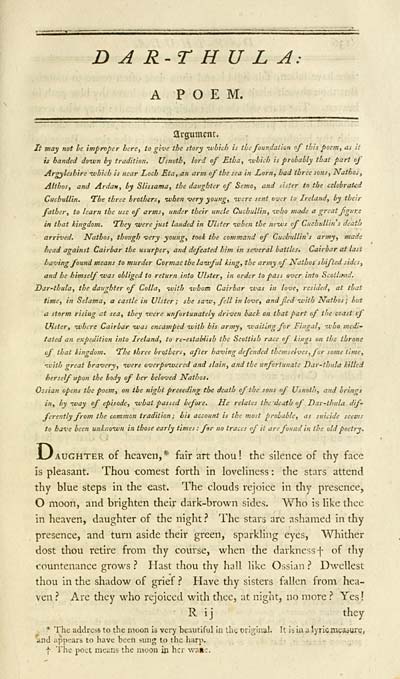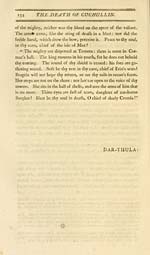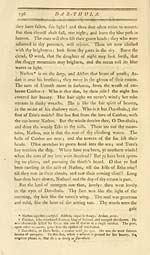Download files
Complete book:
Individual page:
Thumbnail gallery: Grid view | List view

D A R-T H U L A:
A POEM.
argumcnr.
If may not lie improper here, to give the story ivbkh is the foundation nf this poem, as it
is handed down by tradition. Usnoth, lord of Etha, ivhich is probably that part of
Argyleshire itihicb is near Loch Eta, an arm of the sea in Lorn, had three sons, Nathos,
Althos, and Ardan, by SUssama, the daughter of Semo, and sister to the celebrated
CucbuUin. The three brothers, -when very young, -were sent oyer to Ireland, by their
father, to learn the use of arms, under their uncle CuchulHn, ivho made a great fgitre
in that kingdom. They -were just landed in Ulster ivhen the neivs of Ciichullin's death
arrived. Nathos, though very young, took the command of Cuchullin's army, made
head against Cairbar the usurper, and defeated him in several battles. Cairbar at last
having found means to murder Cormac the laivful king, the army of Nathos shifted sides,
and he himself was obliged to return into Ulster, in order to pass over into Scotlimd.
Dar-thula, the daughter of Colla, ivith whom Cairbar was in love, resided, at that
time, in Selama, a castle in Ulster ; she saw, fell in love, and fed with Nathos ; but
a storm rising at sea, they ivere unfortunately driven back on that part of the coast of
Ulster, vuhere Cairbar -was encamped ivith his army, "waiting for Fiiigal, who medi"
tated an expedition into Ireland, to re-estabiith the Scottish race of kings on the throne
of that kingdom. The three brothers, after having defended themselves, for some time,
ivith great bravery, ivere overpo-utered and slain, and the unfortunate Dar-thula killed
herself upon the body of her beloved Nathos.
Ossian opens the poem, on the night preceding tin death of the sons nf Usnoth, and brings
in, by ivay of episode, ivhat passed before. He relates the death of Dar-thula dif'
ferently from the common tradition; his account is the most probable, as suicide seems
to have been unknown in those early times : for no traces of it are found in the old poetry.
D
'aughter of heaven,* fair art thou! the silence of thy face
is pleasant. Thou comest forth in loveliness : the stars attend
thy blue steps in the east. The clouds rejoice in thy presence,
O moon, and brighten their dark-brown sides. Who is like thee
in heaven, daughter of the night ? The stars are ashamed in thy
presence, and turn aside their green, sparkling eyes. Whither
dost thou retire from thy course, when the darkness f of thy
countenance grows ? Hast thou thy hall like Ossian ? Dwellest
thou in the shadow of grief ? Have thy sisters fallen from hea-
ven ? Are they who rejoiced with thee, at night, no more ? Yes !
R ij they
* The address to the moon is very beautiful in the original. It is in a lyricmgaiure,
and appears to have been sung to the harp.
I The poet mcuns the moon in her wdn:.
A POEM.
argumcnr.
If may not lie improper here, to give the story ivbkh is the foundation nf this poem, as it
is handed down by tradition. Usnoth, lord of Etha, ivhich is probably that part of
Argyleshire itihicb is near Loch Eta, an arm of the sea in Lorn, had three sons, Nathos,
Althos, and Ardan, by SUssama, the daughter of Semo, and sister to the celebrated
CucbuUin. The three brothers, -when very young, -were sent oyer to Ireland, by their
father, to learn the use of arms, under their uncle CuchulHn, ivho made a great fgitre
in that kingdom. They -were just landed in Ulster ivhen the neivs of Ciichullin's death
arrived. Nathos, though very young, took the command of Cuchullin's army, made
head against Cairbar the usurper, and defeated him in several battles. Cairbar at last
having found means to murder Cormac the laivful king, the army of Nathos shifted sides,
and he himself was obliged to return into Ulster, in order to pass over into Scotlimd.
Dar-thula, the daughter of Colla, ivith whom Cairbar was in love, resided, at that
time, in Selama, a castle in Ulster ; she saw, fell in love, and fed with Nathos ; but
a storm rising at sea, they ivere unfortunately driven back on that part of the coast of
Ulster, vuhere Cairbar -was encamped ivith his army, "waiting for Fiiigal, who medi"
tated an expedition into Ireland, to re-estabiith the Scottish race of kings on the throne
of that kingdom. The three brothers, after having defended themselves, for some time,
ivith great bravery, ivere overpo-utered and slain, and the unfortunate Dar-thula killed
herself upon the body of her beloved Nathos.
Ossian opens the poem, on the night preceding tin death of the sons nf Usnoth, and brings
in, by ivay of episode, ivhat passed before. He relates the death of Dar-thula dif'
ferently from the common tradition; his account is the most probable, as suicide seems
to have been unknown in those early times : for no traces of it are found in the old poetry.
D
'aughter of heaven,* fair art thou! the silence of thy face
is pleasant. Thou comest forth in loveliness : the stars attend
thy blue steps in the east. The clouds rejoice in thy presence,
O moon, and brighten their dark-brown sides. Who is like thee
in heaven, daughter of the night ? The stars are ashamed in thy
presence, and turn aside their green, sparkling eyes. Whither
dost thou retire from thy course, when the darkness f of thy
countenance grows ? Hast thou thy hall like Ossian ? Dwellest
thou in the shadow of grief ? Have thy sisters fallen from hea-
ven ? Are they who rejoiced with thee, at night, no more ? Yes !
R ij they
* The address to the moon is very beautiful in the original. It is in a lyricmgaiure,
and appears to have been sung to the harp.
I The poet mcuns the moon in her wdn:.
Set display mode to: Large image | Transcription
Images and transcriptions on this page, including medium image downloads, may be used under the Creative Commons Attribution 4.0 International Licence unless otherwise stated. ![]()
| Early Gaelic Book Collections > Ossian Collection > Poems of Ossian, the son of Fingal > (147) |
|---|
| Permanent URL | https://digital.nls.uk/77924311 |
|---|
| Description | Selected books from the Ossian Collection of 327 volumes, originally assembled by J. Norman Methven of Perth. Different editions and translations of James MacPherson's epic poem 'Ossian', some with a map of the 'Kingdom of Connor'. Also secondary material relating to Ossianic poetry and the Ossian controversy. |
|---|
| Description | Selected items from five 'Special and Named Printed Collections'. Includes books in Gaelic and other Celtic languages, works about the Gaels, their languages, literature, culture and history. |
|---|

